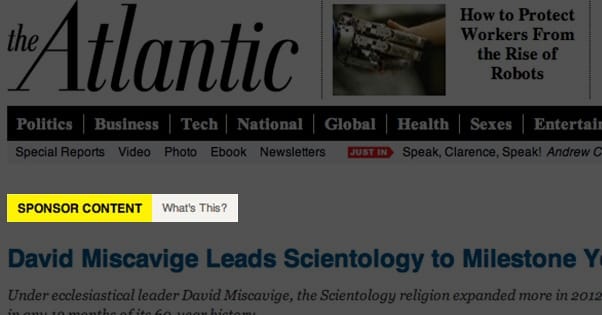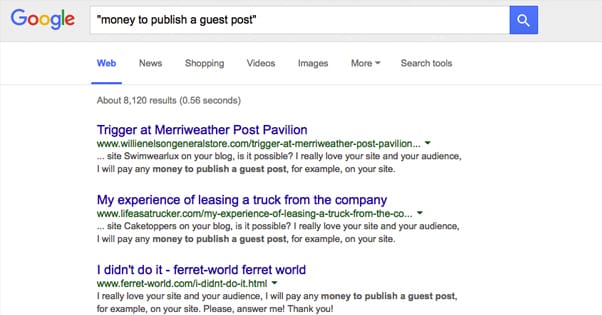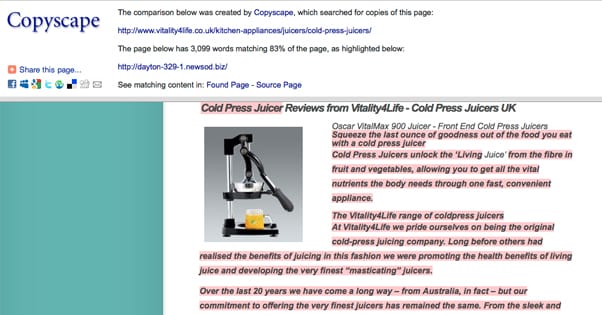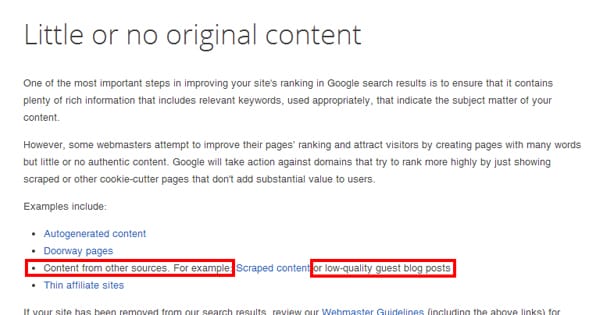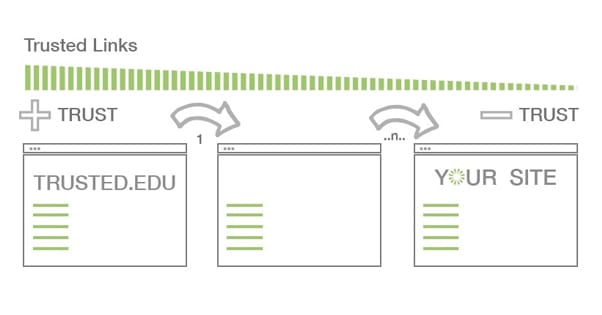Why You Shouldn’t Accept Money for a Guest Post on Your Site
Published by James Parsons • Content Marketing • Posted September 29, 2015 ContentPowered.com
ContentPowered.com
Guest posting is one of the most controversial of the legitimate techniques for brand building, link building and SEO. It has a rocky history, from legitimacy to a raging pushback spurred on by Matt Cutts, to its current position as a maligned but valuable process.
The problem with guest posting is how it has been abused in the past. In itself, there’s nothing wrong with it. You own a blog, and you accept posts from other writers. As long as those posts are good, as long as they aren’t copied, why wouldn’t they be valuable?
The issue is when there’s more than value and good writing involved. Usually, the problem comes down to money. There are two ways money can change hands with guest posting. One is legitimate and perfectly acceptable. The other can land you in hot water with Google.
The first and most legitimate way is to just pay for guest posts. This has been a time-honored tradition for many blogs for a decade, and why not? Guest posts should be high quality. Guest writers should pay attention to guidelines, to voice, to topic, to all the little details that make a post fit with a blog. If you want to attract the highest quality writers, you need to do it with some money on the line.
By paying for guest posts, you give yourself a guarantee of quality, and you allow yourself to be serious about rejecting posts that just don’t fit. You have more of a filter, and you don’t need to justify yourself. Not that you really need to with plain free guest posts, it’s just more expected out of those who pay.
As you might expect from the title of this blog post, I’m not here to talk about buying guest posts. I’m talking about the questionable exchange of money when people pay you to accept their guest posts.
At first glance, this seems like a neat little idea to boost your cash flow a little. Someone wants to pay you to publish a post on your blog. Seems nice, right? You get a little money, you get a bit of content, you’re good to go.
The problem is, when you’re accepting money for a guest post, who is paying you? Take a look at this Google search. You see the same comment spammed a thousand times on all sorts of blogs. The blogs themselves aren’t high quality, the comments certainly aren’t, and the posts they would write are very likely going to be on the same quality level as the comments. That is, complete spam created just for this minor advertising opportunity.
You can bet that the “pay any money” bit isn’t actually as lucrative as it sounds. If you can get $1,000 out of them, well, maybe that might be worth it. Chances are they’d balk at anything over $10. They’re targeting naïve blog owners who don’t know anything about guest posting or blog monetization, and who think making $10 from a blog post is a great idea.
Guest posting as it is already has a pretty shady reputation, for which I blame Matt Cutts. In this little blog post right here, Matt – then the head of webspam at Google and the guy in charge of telling you why your site lost 90% of its traffic overnight and why you’re dumb to have been doing that thing in the first place – declares guest posting done. He calls it too spammy, too gamey, to be recommended as a technique.
Of course, people who know what they’re talking about immediately realized that guest posting wasn’t dead as a technique, it was just going to be more heavily monitored. Anyone who sends out unsolicited spam emails asking to guest post on a site is very likely going to have their site penalized for their trouble. Meanwhile, the people who accept carefully vetted guest posts, complete with a lot of value, will be perfectly fine.
The problem with receiving money for a guest post publication is that you’re turning yourself into a business that accepts money to publish articles. From that point on, Google doesn’t know whether an article is a paid post or not.
Some rare sites can get away with “sponsored posts’ but most can not. You need to have a lot of value and a lot of influence built up if you want to get away with it. Even then, it might hurt you a little, but at that point you’re meant to be too big to fail.
From the other side of the transaction, what about the blog writer? What is their motivation? Obviously, they’re hoping to get something out of the post. Since they’re not trying to earn money from the post, it has to be a non-monetary form of compensation. In the vast majority of cases, the compensation they want is going to be a dofollow link to their blog.
If you notice, this is specifically the kind of thing Matt Cutts calls out as a spammy guest blogging tactic. Getting followed links from blogs you don’t own, through content you create, is a sort of artificial means of boosting your SEO.
In many ways, you can compare the practice to the “Vanity Press” concept in the literary world. Though these have been dying out with the advent of Amazon self-publishing through Kindle Direct or through Smashwords or Barnes and Noble’s version of the same. The idea is simple; want a book published? Pay to publish it.
As an author, it’s a tempting prospect to see a book in print, but amongst those older and wiser, a vanity press is a sign of a naïve and gullible writer. The idea is that you only use a vanity press if you’re more concerned about having a tangible book in your hand than you are about making money from it. You’re using a vanity press because no publisher will pick up your work, which means it has some kind of flaw that makes it unpublishable by one of the major houses.
It’s the same with these “I’ll pay you to post this” guest posts. It has a flaw that makes it unpublishable.
What kind of flaws might it have? Well, let’s take a look at what makes a guest post good, and why accepting money to publish it might not be a good idea.
Hallmarks of a Good Guest Post
There are several important qualities that must be present in any guest post before you publish it, regardless of whether you’re paying for it or being paid for it.
1: Uniqueness.
The number one killer of websites when Panda rolled out in 2011 was the issue of copied content. Prior to Panda, it was not uncommon to see blogs publishing their content across the web. Write one guest post, submit it to 100 different sites, 75 of them publish it, and now you have 75 more links pointing at your site. It was an excellent way to build links, back when link building worked that way. These days, it doesn’t. The content syndicated on each site will be considered copied, and will be detrimental to both the host site and the writer’s site.
One warning sign you should look for if someone is trying to pay you to publish a post, is the uniqueness of that post. Run it through Copyscape, but don’t trust Copyscape for everything. The content could be spun, or it could be stolen from a source that isn’t in the Copyscape index. Run Google searches for lines from the post and see if anything comes up.
Duplicate content can do nothing but hurt you, and the links in it to other sites will likely be detrimental to those sites. If the content a writer is trying to submit to you is copied, reject it out of hand. Don’t let them try to pay in advance to guarantee publication, either. Refunds are a hassle, anyways.
2: Quality.
In this, I’m strictly talking about the quality of the writing, the research, and the opinions. The content you publish on your blog, guest post or not, paid or not, needs to be of the highest possible quality on a technical level. Typos can sneak in, but do your best to catch them. Make sure grammar is correct throughout the piece, and try to avoid publishing content that reads as if it was written by someone who barely understands English. Make sure it likewise doesn’t read as if it was spun.
While you’re at it, dig a little deeper. Do the conclusions of the post jive with the content on your site? You don’t want to publish a post about how great bacon is on your vegan blog, after all. Look at the research and links the author used when citing sources. Are the sources cited properly? Are they original sources? Are they quality information? If you have reason to suspect that the post is a front-end for a link scam wheel or pyramid, reject it.
Feel free to ask for revisions. If the author won’t do them, it’s a warning sign. They’ll back of when you refuse to publish the post as-is and will look for another victim.
3: Value.
The third thing to look for in a post is value. This is distinct from quality. A high quality post can still be valueless to your blog if it covers an irrelevant topic. You don’t want to publish content that doesn’t do anything to benefit your site, right? That’s the problem with a lot of syndicated or sponsored blog posts; they don’t do much more than follow a basic keyword that may or may not be very relevant to your site.
You want to make sure any content you publish looks like something you could have written and published on your own. If it’s not something that fits the tone, the voice, the conclusions and the topics present on your site, it’s not something you should publish. This will be a pretty subjective judgment, but you can bolster your judgment with evidence. Do some research into the topic and see if you can come to the same conclusions, or if there’s evidence that refutes the points and isn’t addressed. You don’t want to publish something of low value and look like a shill, just because the writer paid you to do it.
4: Continuity.
I’ve already mentioned this, but it’s important enough that I feel the need to create a bullet point specifically for it. Your blog has a theme. It has a voice. It has a stance. You cover issues, and when you cover them, you cover them from your own unique perspective. No guest blogger is going to have the same perspective, but ideally they will have a similar outlook.
Without that similarity, you run into issues where you’re being asked to publish a liberal blog post on a conservative blog, or you’re being asked to publish a pro-issue post on a blog that historically has an anti-issue stance. The only possible reason you would have to publish such a post – outside of money, of course – is if you were going to refute or argue the post in some fashion. I suppose you could be posting it to mock it, but that’s not an effective use of time.
5: Reputation.
This bullet has less to do with the content itself and more to do with the author who is trying to get you to publish it. Who are they? Be careful in your research here. It’s not really all that hard to register an email address that looks convincing and pretend to be someone with a big name. I’m not sure what sort of long con an impersonation plus paid link building would be, but hey, you never know what some desperate, low-quality webmasters will try to pull.
In this respect, someone with no reputation might not be a bad thing. No reputation can just mean they’re new on the scene and they’re trying to get exposure any way they can. What you have to watch out for are the sites known for being spam, using gray hat tactics, or being shady in some way or another. Avoid any writer with a shady past; you don’t want their name dragging down your trust with the search engines.
6: Links.
This is, by far, the biggest source of issues from guest posts of any type. Every single link on your site needs to be carefully managed. When you’re publishing a guest post, you need to maintain absolute control over the links in the post. Acquiesce to no demands. Don’t let a writer attempt to control the content on the blog you own.
Every link should be relevant to the context of the text, and every link should lead to a valuable page. If a link is irrelevant, remove it. If a link leads to a spammy or thin site, remove it or nofollow it. I prefer removing it entirely; you don’t want to even imply support for such a site.
99% of the time, when someone sends you a message asking you to publish a guest post they write, what they want out of it is a link to their site. That’s simply the currency, the value, of guest posts. That’s why you need to make sure their site is worth linking to in the first place. If it’s not, don’t accept the guest post, no matter how much they decide to pay you.
7: Rights.
This is a small one, but it can be a major detail. Make sure that any time you accept a guest post, you have a firm terms of service and contract for it. You need to make sure you have full ownership and publication rights to the content.
If you don’t, you’ll run into issues where a post looks fine and you publish it, only to find that the writer went out and got other people to publish it as well. Sometimes, other bloggers won’t be as keen to look for originality in the posts they publish, either through ignorance or through a lack of care.
In rare cases, the post will be perfectly legitimate and the writer won’t try to sell it elsewhere, but they may come into a dispute later down the road. You want to make sure all of the relevant legalities are on your side.
8: Promotion.
This final bit is more of a social commitment than anything technical to watch out for regarding the post or the person who writes it. You want whoever is guest blogging on your site to help promote that post. Ideally, they will share it via their social accounts and possibly link it on their own blog. If the writer doesn’t want to help promote the content, then you have to ask yourself; why not? Do they not want their name associated with it? If so, do you?
There are also some warning signs that indicate something is up when someone is trying to get you to publish their guest post. Offering money for it is one, but it’s not necessarily completely evil.
The worst warning sign is when the author asks for an author account on your blog. Under no circumstances should you ever give out an author account to anyone you don’t have directly on staff, under contract, where there can be legal repercussions for tampering or sabotage.
The reason for this is because an author account is a lot of authority and access to your site. Even if you lock it down, it still gives a writer a lot of ability to see what you’re doing, potentially stealing content that hasn’t been published yet. This happened to Cracked a while back, since most of their content is sourced through a writer forum that’s hidden from guest eyes. Plus, an unscrupulous author with an unlimited account can be bribed into deleting content they shouldn’t, making unwanted edits, or just posting sub-par content without editorial overview.
Moral of the story: don’t let it happen. Don’t accept payment for publication unless you’re absolutely, 100% certain that everything is on the up and up. Here’s a tip: it won’t be. True, high quality guest post authors pitch their value to you, not their checkbook.
